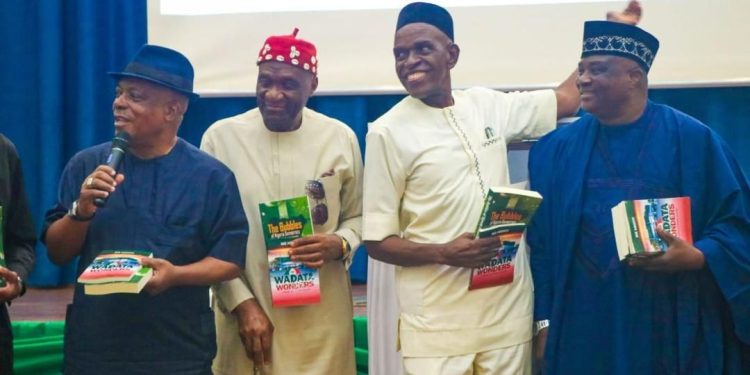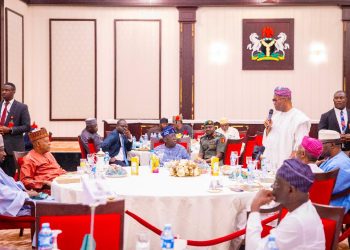By Martins Oloja
What UK newspapers do you read and why?
Years ago, on a very clever and funny British sitcom about government (yes, I know, but it really was clever, funny and very popular), called Yes, Prime Minister there was a lovely bit of dialogue on the subject of who reads which newspapers: PM Jim Hacker: Don’t tell me about the press. I know exactly who reads the papers:
The Daily Mirror is read by people who think they run the country; The Guardian is read by people who think they ought to run the country; The Times is read by people who actually do run the country; the Daily Mail is read by the wives of the people who run the country; the Financial Times is read by people who own the country; the Morning Star is read by people who think the country ought to be run by another country and The Telegraph is read by people who think it is the PM.
Sir Humphrey: Prime Minister, what about the people who read The Sun? Bernard Woolley: The Sun readers don’t care who runs the country, as long as she’s got big tits. This joke wasn’t new, it actually predated Yes, Prime Minister by several years, but it referred to The Sun’s tradition of Page 3 girls (wearing very little) in particular. It was close enough overall to the perceived truth to be funny! Personally, as someone in no position of importance, and without much money, I actually read The Times for preference. It’s mildly conservative in style (nowhere near as consistently right-wing as The Telegraph and The Daily Mail) but actually provides space for a very wide spectrum of political views, the writing is mostly of a high standard, and the online discussions between readers are very lively and entertaining. It’s worth the subscription to get past the pay-wall, in my opinion.
Abonyi and imperative of alternative views in a democracy
The author shows in so many articles in both books that in a functioning democracy, the presence of alternative views is crucial for ensuring that citizens have access to a wide range of perspectives and ideas. This diversity of thought allows for informed decision-making, promotes critical thinking, and fosters a more inclusive and equitable society.
The benefits of alternative views
Alternative views provide a necessary check on power and ensure that those in authority are held accountable for their actions. By presenting different perspectives, alternative views encourage critical thinking and promote a more nuanced understanding of complex issues. This, in turn, leads to more informed decision-making and a more engaged citizenry.
The importance of dissent
Dissent is a vital component of a healthy democracy. It provides a necessary check on power and ensures that those in authority are held accountable for their actions. Dissent also promotes critical thinking and encourages citizens to question the status quo.
The challenges of promoting alternative views
Promoting alternative views in a democracy can be challenging. Those who hold dominant views may seek to suppress dissenting voices, and the media may be pressured to promote a particular agenda or ideology. However, it is essential to overcome these challenges and ensure that alternative views are given a platform.
Therefore, Abonyi’s courage in declaring himself as a partisan journalist is a remarkable statement to the media and managers of the political parties that we can’t continue to follow the same line of action or policy thrust. The imperative of alternative views in a democracy cannot be overstated. Alternative views as clearly stated above, provide a necessary check on power, promote critical thinking, and ensure that citizens have access to a wide range of perspectives and ideas. The media plays a crucial role in promoting alternative views, and dissent is a vital component of a healthy democracy.
By promoting alternative views and embracing dissent, we can create a more inclusive, equitable, and just society. That is what Abonyi has shown and so Editors and sales managers who are blaming the social media for poor sales and advertising patronage should ask market surveyors and scholars to do a survey and research on: What Nigerian newspapers do you read and why? The responses to questionnaire here will help us to be more focused and customer-centric in our content production, just like the British and others.
Abonyi’s bold statement in his books demonstrates that a time to be balanced is gone. It ‘s a digital journalism story time. It’s a time to have news journal that will tell the story of enterprise in the South East. It is a time for the so-called one-sided story of very educated elite and in the South West. It is a time to ask the media and the elite what happened to the South West. It is a time to tell the story of intentional agriculture business and what happened to it in the North. It is yet another time to ask the northern elite and their media what happened to the Ground pyramid in Kano, for instance.
Abonyi is saying through his book you will enjoy that it is a time to ask the Nigerian elite in the North and the South: what happened to the very influential New Nigerian, Daily Sketch, Herald, The Tide, The Star, The Standard, The Chronicle, (where it all began for Raymond Ekpu), The Pioneer, Triumph, which used to tell Nigerian readers the difference Kano used to make via the party of the ‘talakawas’, People’s Redemption Party (PRP). State-owned newspapers such as Daily Graphic still thrive in Ghana, for instance.
It is a time to relive and re-tell a one-sided story of the ‘Tiv Riot’ in Benue state and how its effects are still fuelling the current insurgency in Benue State some alleged ancient land grabbers have vowed to conquer. It is a time to tell the so-called one-sided story of how a businessman, Alhaji Aliko Dangote from the Hausa people they continue to claim the Fulani conquered has established the world’s only single largest train of refinery in Lagos and not in Kano. It is a time to tell the world that the only rival who is trying to compete with Alhaji Dangote in Lagos too is another investor from the same Kano of the Bua Group, Alhaji Abdul Samad Rabiu. Where is the niche journal to tell this one-sided, partisan story about our diversity and business people in the mix?
It is a time to tell a single significant story of how the iconic Ernest Sisei Ikoli, one of the first notable journalists and freedom fighters in Lagos and indeed West Coast of Africa from Brass in today’s oil-rich Bayelsa State formed the first Lagos elite party, Lagos Youth Movement, which he later renamed Nigerian Youth Movement. Ikoli, an organic Ijaw man, was the first Editor of legandary Adeyemo Alakija’s Daily Times in Lagos where some people without deep sense of history are renaming Streets and Bus Stops. Oh history, where is thy compass?
It is a time to ask Alhaji Bukar Zarma, a Babur man, (not Kanuri) from Borno state why there is no longer an Abuja Newsday, Abuja’s premier newspaper, which began to tell a so-called single story of the Abuja’s indigenous population, original inhabitants and how they surrendered their heritage, yes their organic fathers’ land to other Nigerians who were looking for a new national capital, exactly forty-nine year ago.
Why is there no journal or television to tell Abuja’s partisan or partisan story?
It is a time to tell another one-sided but significant story from Africa to the so-called powerful G-8 members that “Africa has come age” as was originally told some 49 years ago when Hurricane Ramat Murtala Mohammed told them on Sunday January 11, 1976 in Ethiopia when there was a continent then united about the independence of Angola.
It is a time to find a journal of a one-sided story, which will contextually report the main reasons the Kanuri-centric people of North East are resisting the renaming of their iconic University of Maiduguri after a General and a former President of North-west extraction.
It is a time to tell the one-sided (partisan story) of the plights of Christians in Tafawa Balewa LG areas in Bauchi State, Biliri People in Gombe State, Zuru area in Kebbi State, and in most Local Governments Areas in Adamawa state. Who will tell the single story of these people and many others from other places including Christian-dominated Southern Kaduna (state) where their even brilliant children still cannot gain admission to read certain courses including Medicine and Law even in federal universities even when they (applicants) score the maximum point in UTME. Who will tell the single story of even the professors who are Christians but can never apply to be vice chancellors of even federal and state universities located in certain jurisdictions in the same northern Nigeria?
Who has written a one-sided story of how a state in the South South, Akwa Ibom State, has established actually one of the most reliable, if not most preferred airline, Ibom Air, in a complex federation where even the federal government duped its people for eight years about revival of a national carrier they claimed they established on their last day in office with a scandalously painted aircraft from Ethiopian airline? It is a time for the same Akwa Ibom people to tell a one-sided story of how they also constructed the only FIFA-certified stadium in their capital Uyo, which is very close to Malabo, capital of another country.
What is the significance of all these so-called single or one sided stories as some narratives of some state actors and non-state actors who are paid to spin for them always try to impose some agenda on all us? We need to emulate Ike Abonyi even if we are called partisan reporters or writers so that most of the muted voices in various locations across the country can be heard through community journals, newspapers, radio and televisions.
On the whole, Ike Abonyi’s two well-written books should be encouraged by buying more copies because they represent alternative views. Let us have more of the so-called partisan voices and pieces so that we can be better informed about what our public officers are doing and what they have failed to do. At such a time like this, we need diverse, partisan, one-sided, single voices to tell our different stories. Just like Ike Abonyi’s partisan voice of courage.
•Concluding publication of my review of Ike Abonyi’s two books: The Bubbles of Nigerian Democracy: The Musing of a Nigerian Journalist, and WADATA WONDERS: Memoirs of a Partisan Journalist. Newspaper subscription bundles
PHOTO CAPTION:
L-R: A former National Chairman of the People’s Democratic Party (PDP), Prince Uche Seconds; a former President-General of Ohanaeze Ndigbo Worldwide, Chief Nnia Nwodo; the author, Mr. Ike Abonyi and representative of the Chief Presenter and the Director-General of the PDP Governors Forum, during the public presnetation of two books: The Bubbles of Nigerian Democracy: The Musing of a Nigerian Journalist, and WADATA WONDERS: Memoirs of a Partisan Journalist. Newspaper subscription bundles, written by Mr. Abonyi, recently, in Abuja.









